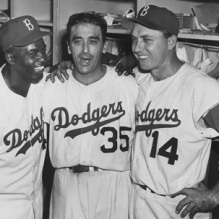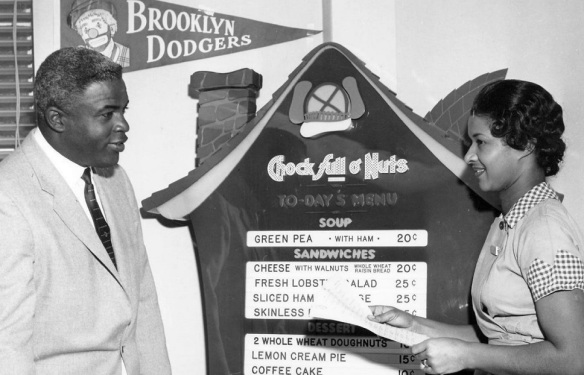Retiring was made almost as tough for the Hall of Famer as making the Show in the first place.By Yours Truly
https://throneberryfields.com/2020/04/15/going-tough-as-coming-for-jackie-robinson/ Jackie Robinson with Sal Maglie (35) and Gil Hodges (14) after a 1956 win
Jackie Robinson with Sal Maglie (35) and Gil Hodges (14) after a 1956 win
for Maglie—once a hated Giant but, in ’56, the veteran who helped make
the last Brooklyn pennant possible . . . before Robinson’s retirement intention
was rudely interrupted by a trade to the Giants.When baseball observed the centenary of Jackie Robinson’s birth last year, I wrote my own tribute in which I included a somewhat passing mention of his retirement after the 1956 season. Robinson had things tough enough when he was granted the opportunity to re-break baseball’s disgraceful colour line. He wouldn’t exactly have them simple for the rest of his life, either.
The Hall of Famer changed baseball’s face, for however long baseball accepted it kicking and screaming. This year’s Jackie Robinson Day falls while baseball remains under suspension thanks to the coronavirus. I can’t help remembering that coming and going were tougher for him than they should have been.
Robinson and his Dodgers went through and won a final pennant race together in 1956. They lost the World Series in seven to the Yankees a year after they won it in seven for their only world championship as the Brooklyn Dodgers. At age 37, the knees Robinson punished for ten major league seasons finally told him not to even think about playing baseball for one more season.
He had a job lined up, with Chock Full o’Nuts, the coffee makers whose chain of lunch counters featured mostly black staff, where he’d be vice president in charge of company personnel. He’d also agreed to tell the story of his retirement to
Look magazine for $50,000. He made only the mistake of not making his retirement intentions formal with baseball’s administration or public just yet.
And that hesitation, which many players experienced before and after Robinson, delivered an unexpected posterior bite in December 1956. The Dodgers—now long run not by Robinson’s original patron Branch Rickey but by Walter O’Malley and Buzzie Bavasi—decided to trade him to . . . the crosstown Giants, of all teams.
The same Giants against whom Robinson’s Dodgers had a blood feud that continued after both teams moved to California after 1957. The same Giants whose pitcher Sal Maglie was considered such a Dodger nemesis (
If that sonofabitch Maglie throws at my head one more time, I break my bat across his [fornicating] dago head—Dodger right fielder Carl Furillo) that Brooklyn fainted when, after a halting spell in Cleveland, the Dodgers bought the 39-year-old Maglie about a quarter way into the 1956 season.
Perhaps more surprising, getting Maglie helped make the final Brooklyn pennant possible. Maglie had a 2.87 ERA with the ’56 Dodgers, led the National League in ERA+, and finished second to his rotation mate Don Newcombe for baseball’s first Cy Young Award. The bad news was that Maglie was also the very hard luck loser on the flip side of Game Five of the ’56 World Series—Don Larsen’s perfect game.
With the Dodgers now trading Robinson to the Giants for lefthanded pitcher Dick Littlefield and about $30,000 cash, you might imagine competition between Dodger and Giant fans over who’d faint first and hardest. You might also imagine sports cartoonists of the day having a field day with it. According to Roger Kahn in
The Boys of Summer, one magazine was preparing along that line:
Sport commissioned a cover illustration of Maglie the Dodger pitching to Robinson the Giant. But you might imagine even further Robinson fighting a battle in his own mind.
 Jackie Robinson with an unidentified staffer in his Chock Full o’Nuts office. His association with
Jackie Robinson with an unidentified staffer in his Chock Full o’Nuts office. His association with
the company provoked Casey Stengel to a wisecrack when the two had a public argument:
“Jackie Robinson was a great player, but now everybody knows he’s Chock Full o’Nuts.â€The Giants were ready to sign him to a generous enough 1957 deal, and Chock Full o’Nuts’s president William Black—perhaps mindful of the extra publicity thrust likely to arise—was ready to hold Robinson’s job for him if he did decide to play one more season. Still marveling at the imagery of Dodger Maglie against Giant Robinson,
Sport editor Ed Fitzgerald asked Kahn, a
Sport writer at the time, to find out first if Robinson would indeed suit up for the Giants.
Robinson “was vague,†Kahn would remember of that telephone call. He acknowledged the Giants offering $40,000 for him to play in 1957, followed by $20,000 a year as a scout for the two seasons to follow. But when asked if he’d play, he could only say, “Whatever I do, I’ll give it all I’ve got.†“What Robinson was trying to say (and has never known how to say),†Kahn remembered, “was ‘No comment’.â€
A month later,
Look called a press conference announcing the publication of Robinson’s article, “Why I’m Quitting Baseball.†Robinson said he’d had help with the piece but, no, the trade to the Giants didn’t make him quit, he’d already started work on the
Look article when he got the call about the trade. Two days after the
Look press conference, though, Bavasi shot his own mouth off to the press. “Robinson will play,†Bavasi said. “I know the guy and he likes money. Now that Look‘s paid him, he’ll play so he can collect from the Giants, too.â€
“If Mr. Black had come to me and said it might be a good idea for me to play,†Robinson
told New York Daily News columnist Dick Young, not always a Robinson fan, “I certainly would have considered it.†Bavasi changed all that: “[T]here isn’t a chance—not if Mr. Black got down on his knees and begged me to stay.†One small irony was that, at Chock Full o’Nuts, Robinson’s duties would include doing his best to keep personnel turnover minimal.
“Reading [Bavasi’s] sentences,†Kahn eventually wrote, “Robinson knew: the retirement [from baseball] wold have to be permanent. Already [
New York Herald-Tribune columnist] Red Smith was attacking him for ‘peddling a news story, the rights to his retirement.’ If he did play again, critics would denounce him as a phony. His baseball years, begun with heroic pioneering, could end amid cries of fraud.â€
The knees that drove him to think about retiring in the first place helped bail Robinson out of an untenable situation at last. (The commissioner’s office voided the deal, returning Littlefield and their thirty large to the Giants.) They also reinforced his retirement decision and removed any lingering doubts on Opening Day 1957, when he awoke unable to get out of bed thanks to his right knee swelling to a size comparable to a pumpkin.
Writing upon Robinson’s death at 53 in 1972, Smith himself described him as “the unconquerable doing the impossible.†Indeed. You couldn’t beat him with a trumped-up Army court-martial. Baseball’s racists couldn’t grind him down. When he suited up, as ally-turned-adversary Leo Durocher once observed, “He didn’t just come to play. He come to beat you. He come to stuff the goddam bat right up your ass.â€
Robinson also turned baserunning into guerrilla warfare. Baseball knew its base thieves in the past; Robinson turned even the threat of grand theft into must-see viewing. Smith swore that television introduced split-screen viewing so you could see the pitcher vs. the batter on one side and, on the other side, Robinson on base making that pitcher “wish he didn’t have to throw.â€
Jackie Robinson established the black man’s right to play second base. He fought for the black man’s right to a place in the white community, and he never lost sight of that goal. After he left baseball, almost everything he did was directed toward that goal.
Hadn’t coming to and staying in the Show been tough enough without his retirement getting caught in cynical machinations not of his own making? Sal Maglie the Dodger wouldn’t get to pitch to Jackie Robinson the Giant, after all.
---------------------
@Polly Ticks @AmericanaPrime @andy58-in-nh@Applewood@catfish1957@corbe@Cyber Liberty@DCPatriot @dfwgator@EdJames @Gefn@The Ghost@goatprairie@GrouchoTex @Jazzhead @jmyrlefuller @Mom MD@musiclady @mystery-ak @Right_in_Virginia @Sanguine@skeeter@Skeptic@Slip18@Suppressed@SZonian @truth_seeker